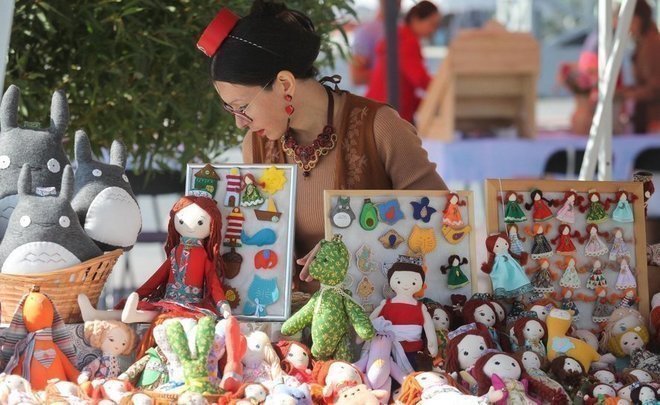‘We’re all on our own, everybody paves the way as much as they can’: Tatarstan craftspeople waiting for united platform

Masters of folk arts and crafts in Tatarstan have to find sites to sell their products on their own. An industrial park, craftspeople’s centre Rais of the Republic Rustam Minnikhanov announced at a meeting of the Council for Culture is to help unite their efforts. Realnoe Vremya’s correspondent listened to opinions of people in the sector if this could solve topical problems of masters.
“True Tatars”
Nailya Ayzyatova from Samara Oblast was born to and grew up in a Tatar family. Even though she doesn’t have relatives in Tatarstan, the young woman moved to Kazan with her family “to be closer to her nation, to her culture.”
The master explained that her first fair was in 2020. She was given half the table at the Hay Bazaar. Rais of Tatarstan Rustam Minnikhanov and Russian Vice Minister Marat Khusnullin noticed Nailya’s works on that day. Since then, the participation in the festival has become traditional for the master, but it turned out to be tough to get to other fairs and exhibitions, admitted Nailya Ayzyatova.
“We all seem to be on our own”
“Unfortunately, many craftspeople now work on their own, everybody lives in their own world. We don’t have a community. I am a member of a private chat where I find information I need. First of all, social media unite all masters. This happens literally the following way: you see on somebody’s account that an exhibition or a fair was held, write to this master and ask who organised it, how they went there, if they could share contacts. They often don’t give me phone numbers, say that they were invited, sometimes they promise telling the organisers about your existence. In other words, everything happens by touch, the master explains.”
The woman admitted another difficulty that arose due to the latest geopolitical events. Earlier, ceramic masters used material from Donbass, it had a lot of plants clay was supplied from. Now all supplies stopped. Many started buying it in Turkey. This feedstock is more expensive and the technique of working with it is different, the woman complained.
“Folk arts and crafts aren’t a priority”
Chairwoman of the Committee for Souvenirs and Folk Arts and Crafts of the Tatarstan Chamber of Commerce and Industry Diana Basyrova also recognised that there was no agency at the moment that would unite all craftspeople:
“There are several good coordinators but there is certainly no joint work uniting all craftspeople. One has to call, write, learn something on one’s own, so many actions are taken at the same time becoming less effective. The sector of folk arts and crafts is officially regulated by the Ministry of Culture that has many other duties apart from this. Moreover, folk arts and crafts aren’t a budget revenue generating area, they aren’t a priority.”
The committee in the Tatarstan Chamber of Commerce and Industry works mainly with those producers who also run an entrepreneurship activity, but at the same time, it works with craftspeople who remain illegal urging the latter to change their status. It should be reminded that it became known at a meeting of the Council for Culture chaired by the Tatarstan rais that over 1,500 arts and crafts entrepreneurs mostly worked unofficially continuing registering their type of activity as educational services, shoe repair, etc.
“I think that being a self-employed is the perfect form of activity for craftspeople. You create and sell something yourself. But even in this case, there are still many who remain in the grey zone. For instance, mums on maternity leave. They want doing arts and crafts, find ways of selling products but cannot become self-employed because they are on maternity leave. There are few people who run a business with big workshops and hire workers, there is a handful of them. This is, of course, not enough for our big republic, with such rich history. Support and conditions are needed to make sure they develop and expand,” the newspaper’s interlocutor says.
“Marketing and sale are key problems”
Diana Basyrova said that marketing, advertising and sale were the main problem in masters’ opinion. Also, there is a feedstock problem:
“It is necessary to use good feedstock to provide good products. It is often imported. Consequently, the prime cost of a product increases and the commodity becomes more expensive, in other words, it is less affordable for the majority.”
It is problematic to obtain information about where and when fairs will be held from one place. Now all the agencies working with craftspeople are in discord, the chairwoman of the committee admitted.
“The committee created a chat where all information about fairs or other events for masters is posted. It is important for us this not be reselling but one’s own production, made in Tatarstan. We do verification and check if a person is really a producer, we add such people to our private chat. Now the committee is preparing a new project that will help to make information public, raise the interest in fairs, exhibitions, training more openly. This project is about to see the light. We are learning the experience of other Russian regions,” the interlocutor of the newspaper added.